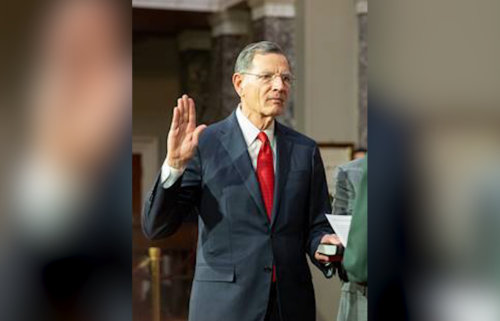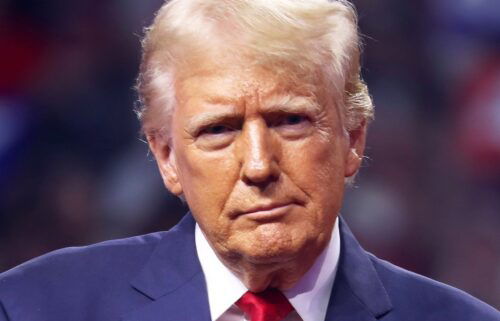Wyoming primary: 2 Republicans dominate Senate, House races

CHEYENNE, Wyo. (AP) - Two well-known and well-funded candidates dominate a dozen Republicans while a bigger-than-usual field of Democrats seek nomination for the U.S. Senate and House in Wyoming's primary Tuesday.
The Republican winners will be heavy favorites in GOP-dominated Wyoming when voters decide in November who's best for a state suffering from low demand for coal and the ongoing toll of the coronavirus. Even so, five Democrats actively campaigning for Senate and House are a burst of activity for a party that has suffered from waning voter registration, influence and serious candidates in Wyoming.
Former U.S. Rep. Cynthia Lummis, of Cheyenne, is among 10 candidates pursuing the GOP nomination for a Senate seat being vacated by Mike Enzi, a Republican retiring after four terms. U.S. Rep. Liz Cheney faces one obscure opponent for the Republican nod to seek a third term as Wyoming's lone congressperson.
Besides being the only Senate candidate with statewide name recognition after decades as a legislator, state treasurer and congresswoman Lummis through July raised and spent far more than any of her opponents. Lummis, 65, raised over $1.8 million so far this year, including a nearly $600,000 loan from herself to her campaign. She had about $400,000 left.
Lummis now calls herself a solid supporter of President Donald Trump after she initially endorsed Rand Paul in the 2016 Republican presidential race.
"He occasionally tweets things that makes us cringe but what makes me all in - all in - for President Trump is what he's done. I have disregarded what he's said in favor of what he's done," Lummis said.
She praised Trump's record on the economy and employment before the coronavirus pandemic. Despite ongoing delays in coronavirus testing and Trump's months-long reluctance to be seen wearing a mask, Lummis also praised Trump's response to the virus.
"The problem with coronavirus can be blamed solidly on one thing and one thing only and that's the virus. It's a global pandemic," Lummis said. "I think people who have criticized his response are the same people who've never liked him."
Fellow Republicans running for Senate have tried to stand apart from Lummis while backing Trump. For Sheridan energy industry consultant and retired Air Force Lt. Col. Bryan Miller, it was calling Lummis out for saying in 2016 she would be "holding her nose" when she voted for Trump.
"The bottom line is nothing has really changed in Washington other than getting worse overall," Miller, 54, said. "I'm impressed that one man has been able to make some major differences back there, and that's President Trump."
Republican Senate candidate Robert Short, of Douglas, also blamed the Washington political climate and its "finger pointing" while giving Trump - a president who doesn't hesitate to cast blame - a pass.
"The president is trying to call out what he sees as problems," said Short, 58, a Converse County commissioner and owner of power line, communications, construction and drone businesses.
Short through July raised almost $360,000, including $300,000 in loans, and spent almost $300,000, putting him second to Lummis in the money race.
Others seeking the Republican nomination for Senate include Casper attorney Donna Rice, Casper business owner and Wyoming Army National Guard veteran Josh Wheeler, and Centennial geologist and business owner R. Mark Armstrong,
Only one Democrat, Gary Trauner, ran for Senate in 2018. Candidates for the Democratic nomination for Senate this year include University of Wyoming ecology professor Merav Ben-David, of Laramie; self-described "socialist" Yana Ludwig, of Laramie; and Jackson Hole Center for Global Affairs Vice President Nathan Wendt, of Jackson.
Concern about climate change, partly because of her research into polar bears in the Arctic, prompted Ben-David to enter the race and call for transforming the economy of the top coal-mining state by investing in innovation and energy technology.
"My vision is forget the rut, get out of it, do something else," said Ben-David, 61.
Encouraging more worker-owned cooperatives would transform Wyoming's economy by paying employees more and keeping more of that money in the state, said Ludwig, a social justice and environmental activist.
"Our businesses would inherently be more local," said Ludwig, 49. "It would be less about Walmarts and these big companies."
Wyoming has some of the best wind for wind energy projects in the U.S., "but doesn't have the jobs to show for it," said Wendt, 39, whose "bi partisan think and do tank" in Jackson promotes renewable energy in Wyoming and a coal-mining region in China.
Cheney's sole opponent is Blake Stanley, of Banner, who on his website said he has experience mending fences, working in oil fields and welding. Stanley didn't return a phone message. Cheney, 54, won with wide majorities in 2016 and 2018 and this year through July spent almost $2 million of $2.2 million raised; Stanley raised about $2,500 and spent $2,800.
Democrats seeking nomination for U.S. House include Northern Arapaho tribal member and Global Indigenous Council Vice President Lynnette Grey Bull of Fort Washakie. Grey Bull is a leader in the human rights advocacy organization of over 200 tribes and advocates for reducing violent crime against indigenous women.
"I want to create change. I am the working class, I represent the working class, I love working to improve the life of the day-to-day people," said Grey Bull, 43.
Grey Bull has called for boosting public transportation in Wyoming, improving access to public lands and establishing a "treatment to works" program for people addicted to opioids.
Teaching in American schools from South Korea to Poland and most recently France has brought valuable insights Wyoming could use in Congress, said Carl Beach, of Ryan Park.
"The world has become so complex and we see the problems we face become increasingly complex," Beach, 44, said. "Having that experience abroad has given me a wider perspective on the world."
No problems have been reported so far in an election season complicated by the coronavirus, Wyoming Secretary of State's Office spokeswoman Will Dinneen said.
Changes this year included mailing absentee ballot request forms to registered voters in June and allowing county clerks to begin processing absentee ballots the week before the primary to avoid having to handle a large number of them on or after primary day.






